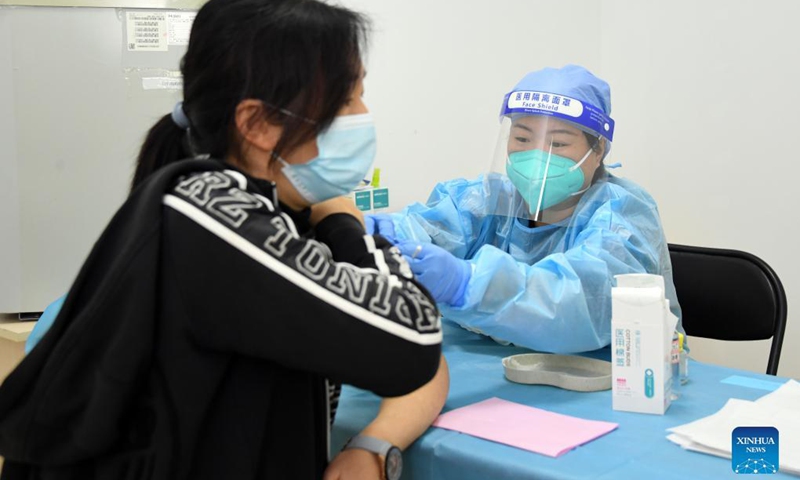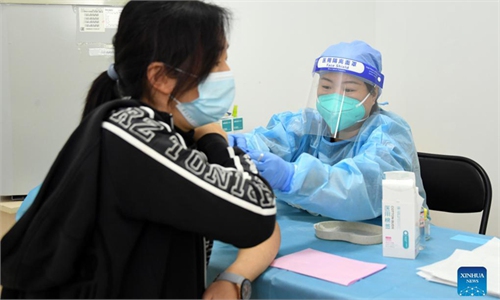Domestic case risks surge as Shaanxi, Inner Mongolia see sporadic infections in early wintry days
‘Extreme caution’ needed on people, items at ports, hospitals

A medical worker administers a booster shot of the COVID-19 vaccine to a woman at a vaccination site in Xicheng District of Beijing, capital of China, Oct. 17, 2021. Beijing has begun to offer a third COVID-19 booster vaccine to people of higher risks in some neighborhoods. Photo: Xinhua
Many places in China are enhancing anti-epidemic measures and accelerating the rollout of COVID-19 booster shots in face of increasing outbreak risk as winter sets in, bringing about a cold environment more suitable for virus survival and transmission.
But in general, it will be a stable winter for Chinese people with low probability of cluster outbreaks, experts said, while calling for extreme caution on personnel and items at ports and medical institutes.
A total of 19 confirmed imported COVID-19 cases were reported on Saturday with another domestic case discovered in Xilin Gol League, North China's Inner Mongolia Autonomous Region, the National Health Commission (NHC) revealed Sunday.
This makes the total number of existing confirmed cases in China 463 with one suspected case as of Saturday, according to the NHC.
Health authorities in Northwest China's Shaanxi Province also reported two novel coronavirus positive cases on Sunday.
The two people, a couple from Shanghai, left Shanghai on October 9 to travel to Inner Mongolia, Gansu and Shaanxi. The husband is surnamed Jiang, 65, and the wife is surnamed Yan, 62. They are both retired teachers from a Shanghai college.
They received negative nucleic acid test results on October 8 in Shanghai and on Wednesday in Inner Mongolia, but an abnormal result in a mixing nucleic acid test in Jiayuguan, Northwest China's Gansu Province, on Friday.
They were required to stay put following the abnormal result but they left Jiayuguan for Xi'an, capital of Shaanxi, without permission.
They voluntarily went to a hospital in Xi'an for a nucleic acid test on Saturday and tested positive. They have been hospitalized, according to Shaanxi health authority.
Shanghai health authority on Sunday also announced that they had launched an epidemiological investigation on the couple's close contacts in Shanghai.
Gansu and Shaanxi health authorities said the couple visited the Danxia National Geological Park and the Pingshanhu Canyon in Zhangye, Gansu and Dayan Pagoda in Xi'an.
Facing reports of new cases across the country, Wang Guangfa, a respiratory expert at Peking University First Hospital, warned that strict anti-epidemic management should be maintained at ports, medical institutes and among transient population. Timely epidemiological investigation is also needed to prevent virus transmission, he noted.
Wang tried to ease public concerns by saying that, despite the low probability of clustered infections, in general, this winter will be stable for China as, on one hand, China has built a system to deal with outbreaks, and on the other hand, rates overseas are easing down as due to growing vaccination rates.
But he also warned of epidemic resurgence overseas despite high vaccination due to virus mutations that may affect vaccine effectiveness, noting the importance of strict anti-epidemic measures.
As of Saturday, more than 2.23 billion of COVID-19 vaccines shots have been administered in China, according to the NHC. Meanwhile, nearly a dozen places across the country are already rolling out a booster shots campaign.
Northwest China's Xinjiang Uygur Autonomous Region and Southwest China's Yunnan Province have launched a booster shot campaign for COVID-19 vaccines, as Xinjiang reported one local asymptomatic case in its capital Urumqi on Friday and Yunnan reported two asymptomatic cases in the border city Ruili the same day.
Urumqi started citywide nucleic acid testing immediately after the report of the one case and a second round is underway on Sunday, a resident surnamed Zhang told the Global Times on Sunday.
"Life is normal for most parts of the city expect for a few communities that have been locked down for quarantine," Zhang said. He noted that Urumqi residents are staying positnvive following the new case and there is no panic-buying at supermarkets.
The virus can survive for a longer time in a cold environment, which increases the danger of people contracting and getting infected. This was demonstrated in the previous year as both the domestic and overseas epidemic worsened in winter 2020, Wang explained.
Wang also warned that attention should not only be given to people who are often contact high-risk personnel, but also high-risk items such as imported goods, parcels and garbage from international airlines, given previous experiences.
For example, a flight from Russia was identified as the source of the round of the COVID-19 infections in July in Nanjing, capital of East China's Jiangsu Province. The outbreak started as airport cleaning staff members were infected when cleaning the cabin.




